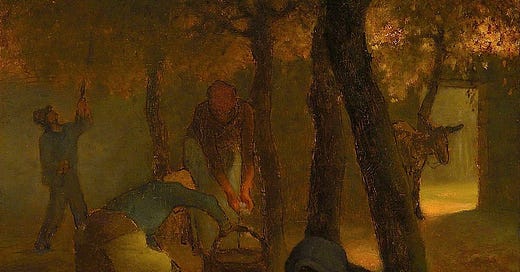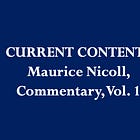This is number (29.) of our sequential postings from Volume 1 of Maurice Nicoll’s Psychological Commentaries on the Teaching of Gurdjieff and Ouspensky.
(If you are a subscriber to The Journal of Gurdjieff Studies, you can opt in or out of receiving emails from the Fragments Reading Club category.)
Links to each commentary will be put on the following Contents page, as we progress through the book:
Part III.—Let us take the phrase already used—namely: "The fact that three forces create means that three wills create." It may be asked if these three wills which proceed from the Absolute are identical when in conjunction with the Will of the Absolute Itself. This cannot be assumed,
113
for it reverses the order of creation by making three pass into one. Three cannot pass into one save by the Will of the Absolute and this would mean the indrawing of all creation. (Notice that if you divide 3 into 1 you get 3 repeating to infinity.) The created Universe proceeds from the Absolute by reason of the three forces which no longer, as such, belong to the Uncreate Absolute. (Compare the Christian cosmology, where in the Athanasian Creed it is said: "There are not three Uncreate, but One Uncreate.") The Absolute is uncreate, unmanifest, unconditioned, and this is beyond all human thought. The three forces proceeding from the Absolute in the first act of creation are already conditioned (1) by the single Will of the Absolute and (2) by their mutual relation to one another as 'Active, Passive and Neutralizing'. These forces at their primal level are all conscious, but already limited, and as their reduplication proceeds in the outbreathing or descending order of creation of all things, they become increasingly mechanical and limited, the further they are in the vertical scale from the Absolute. If we were to say that the sum total of the primal three forces in conjunction together made the single Will of the Absolute, we would imply that the primal three forces would pass into the Absolute on conjunction with each other, in which case there would be no creation. Three would pass into One. But it is the Will of the Absolute to create, and the three forces or separate wills of creation proceed in consequence from the Absolute and cannot return unless it is the Will of the Absolute Itself to draw in all creation. The three primal forces unite to create the Universe in successive stages. They do not unite to form the single Will of the Absolute, which is uncreate, for if their conjunction made a unity identical with the Will of the Absolute, there would be no creative process.
ON THE STUDY OF THREE FORCES IN ONESELF
Part IV.—We have greater opportunities of observing ourselves than of observing the external world. We live very little in the external world, which is foreign to us. We are intermittently aware of it, but notice very little about it. We can pass the same house a thousand times and be unable to describe it. Actually, we are far more permanent even for ourselves than is the world. This is one reason why the study of Three Forces begins with self-observation. Also you must remember that a force is invisible and our more direct contact with what is invisible is by means of self-observation.
You must understand that in trying to study this question of forces you are not studying things. A desire is a force, not a thing, for example. A train of thought is a force and is not a thing. An idea is a force, not a thing.
114
One reason why we have so much difficulty in understanding three forces is that we tend to see in everything one force. We think of force as one, and in everything that happens, in any manifestation, in any event, we tend to see merely one force. We attribute it to one force. We see one action in one event. This is partly due to our inability to think of more than one thing at a time as a rule. Sometimes we think in terms of two things, but to think in terms of three things is beyond us—i.e. it is beyond formatory thought. An event, for instance, must always be good or bad, right or wrong for us. We see only one action in it, and further, we do not even think of events being due to forces. We see an apple falling from the tree and merely see the apple now lying on the ground. We see a magnet attracting or repulsing one pole of a compass. We see it all, but scarcely think of forces—in this case obviously different kinds of forces. Nor do we notice how forces change for us. At one moment we are attracted by a thing and next moment repelled by the same thing. Or we are repelled and then an idea comes to us and we feel attracted. We do not realize that the thing at one time conducts one force and at another time an opposite one. In the same way, our relationship to a person changes. That is, the person undergoes a change of sign for us, and this means that in the triad of forces that produce the relationship there has been a change of forces—e.g. mechanical love can turn to hate, mechanical trust to suspicion, and so on. All such ordinary manifestations in human life are due to forces and changes in these forces. I am not asking you to designate in such cases the forces, but to notice them.
The Three Forces cannot be studied theoretically. The only practical way of studying three forces in ourselves is by doing something. By this is meant imitating or personifying in ourselves one of the three forces, in relation to some other force either (1) acting in ourselves or (2) in external events.
Example:
(1) Struggle with habits,
Struggle with suffering,
Struggle with ignorance, etc.
(2) Struggle with expression of unpleasant emotions towards someone one mechanically dislikes,
Struggle to carry out some difficult task.
In this way we can begin to realize what second force is for us in each case, and from this can begin to catch a glimpse of 3rd force.
Example.—A sudden accession of force that assists one's struggle with a particular task means a change in the quality of the neutralizing force—eg. encouragement may have this effect. The active force in the triad is thus increased and the task (the 2nd force) may be more easily gone on with. On the other hand it may weaken active force (by creating the imagination that one is able to do the task) so that the task becomes active—i.e. the resisting force becomes the strongest.




